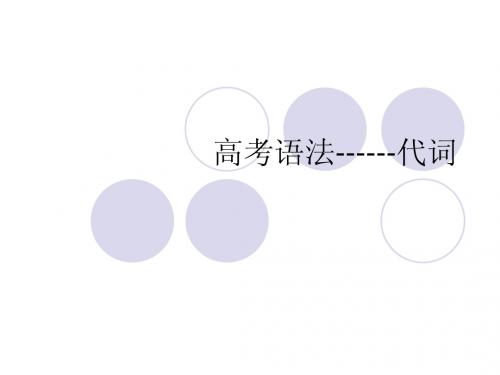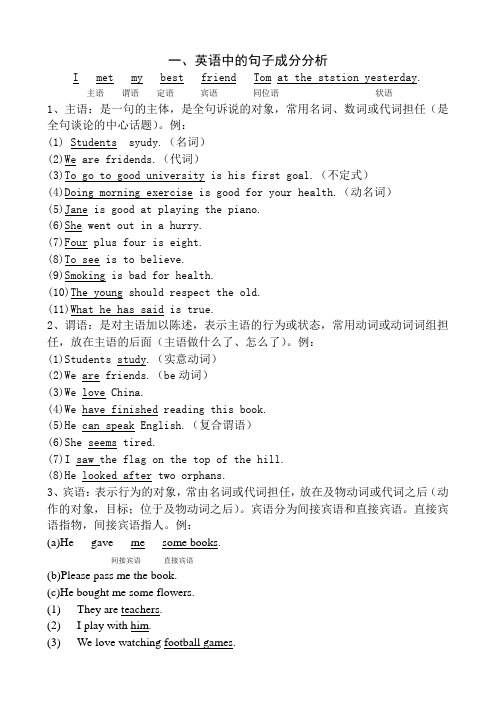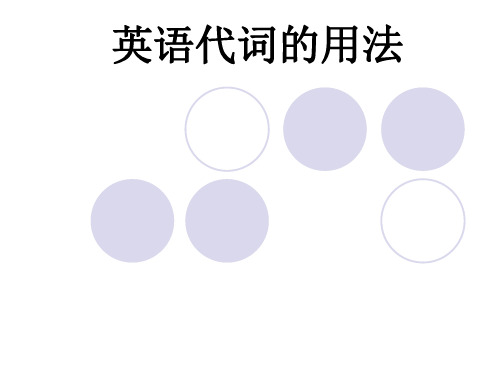无敌英语语法-代词篇
- 格式:pdf
- 大小:139.89 KB
- 文档页数:9

代词 代词是代替名词的词类。
⼤多数代词具有名词和形容词的功能。
英语中的代词,按其意义、特征及在句中的作⽤分为:⼈称代词、物主代词、指⽰代词、⾃⾝代词、相互代词、疑问代词、关系代词和不定代词⼋种。
⼀、⼈称代词是表⽰"我"、"你"、"他"、"她"、"它"、"我们"、"你们"、"他们"的词。
⼈称代词有⼈称、数和格的变化,见下表:数单数复数格主格宾格主格宾格第⼀⼈称Imeweus第⼆⼈称youyouyouyou第三⼈称hehimtheythemshehertheythemitittheythem 例如:He is my friend. 他是我的朋友。
It's me. 是我。
⼆、物主代词是表⽰所有关系的代词,也可叫做代词所有格。
物主代词分形容性物主代词和名词性物主代词两种,其⼈物和数的变化见下表。
数单数复数⼈称第⼀⼈称第⼆⼈称第三⼈称第⼀⼈称第⼆⼈称第三⼈称形容词性物主代词myyourhis/her/itsouryourtheir名词性物主代词mineyourshis/hers/itsoursyourstheirs 例如: I like his car. 我喜欢他的⼩汽车。
Our school is here,and theirs is there. 我们的学校在这⼉,他们的在那⼉。
三、指⽰代词表⽰"那个"、"这个"、"这些"、"那些"等指⽰概念的代词。
指⽰代词有this,that,these,those等。
例如: That is a good idea. 那是个好主意。
四、表⽰"我⾃⼰"、"你⾃⼰"、"他⾃⼰"、"我们⾃⼰"、"你们⾃⼰"和"他们⾃⼰"等的代词,叫做⾃⾝代词,也称为"反⾝代词"。

完整版英语代词用法总结(完整)一、选择题1.Alice was very happy to see that the children were enjoying ________.A.himself B.herself C.ourselves D.themselves 2.—Excuse me, I want to buy a birthday present for my younger sister.—OK. We have new kinds of toys for girls. You can choose for her.A.one B.it C.them D.that3.Jeff dreams of becoming a detective like Sherlock Homes. He thinks there is ________ more exciting than solving a mystery.A.everything B.something C.anything D.nothing 4.—This book on animals is int eresting. I’d like ________. Where did you buy it, Simon?—In the bookshop near my school.A.it B.this C.that D.one 5.—Today’s Yangtze Evening, please.—There’s only one copy left. Would you like ________?A.they B.them C.it D.one6.— Lucy, do you know whose wallet it is on the table?—Sorry, I don’t know. I asked many people, but ________ knew.A.nobody B.everybody C.anybody D.somebody 7.—How many classes do you have on Wednesday afternoon?—________. So we can join any club we like.A.Neither B.Either C.Nothing D.None8.—Wow! Jim plays the piano so well.—Not ________ can play it like this. He works hard at it.A.everybody B.somebody C.nobody D.anybody9.I want to buy a fine tie for my father, but ________ is fit for him in the shops nearby.A.no one B.nothing C.none D.neither10.The shop assistant in Xinhua Bookstore recommended me the four great classical Chinese novels, but ________ was to my taste.A.all B.neither C.nothing D.none 11.—Have you prepared ________ for the picnic tomorrow?—-No, except the drinks.A.nothing B.anything C.everything D.something 12.They all think ________ to create such beautiful music with the transparent cups.A.it amazed B.that amazed C.it amazing D.that is amazing 13.To our sadness, an old man ________ in a wooden house. Nobody knew when he ________. But when I thought of his ________, I always feel pity.A.was found dead; died; death B.has dead; died; deathC.was found dead; death; dying D.has been dead; dying; died 14.Teachers use ________ knowledge to help children become intelligent teenagers.A.they B.them C.their D.theirs15.The young should learn how to look after ________ and be more independent.A.they B.them C.their D.themselves16.It’s known to all that the Chinese are famous for ________ hard work and wisdom.A.they B.them C.their D.themselves 17.Miss Liu is kind enough to help us whenever she is needed. We all like ______.A.she B.her C.him D.them18.Though I agree with most of what you said, that doesn't mean I agree with _________. A.anything B.nothing C.everything D.something 19.—Sam, there are so many spelling mistakes in your paper. You should try not torepeat________.—Sorry, Mr. White. I'll be more careful from now on.A.it B.its C.them D.theirs20.We’d like to recommend Millie as the Young Star because o f ________ effort and kindness. A.our B.ours C.her D.hers21.—This book on Yancheng’s history is interesting. I’d like______. Where did you buy it, Tom? —In the Amazon Bookstore.A.it B.this C.that D.one22.The girl got a new bike from her father and she loves ________ colour very much.A.it B.itself C.its D.it’s23.—Jeffrey always remained calm and mastered his own feelings.—No wonder he is a ________.A.somebody B.anybody C.nobody D.everyone24.The key to success is to start where you are, not when things get better, not if things were different, nor if you had what ________ else has.A.something B.anything C.somebody D.anybody25.He thinks himself ________, but we think him ________.A.somebody, anybody B.somebody, nobody C.anybody, somebody D.anybody, nobody 26.They have provided several ways to solve the problem. We can choose _________ to start with.A.it B.that C.one D.each27.As a child, I would sit for hours under an old tree doing ________, which was simply day dreaming.A.nothing B.everything C.something D.anything 28.—Are your parents angry with you about your English?—Oh, ________ of them is angry. They just told me to get better grades next time.A.none B.both C.neither D.either 29.—Which would you like to choose for your PE entrance exam, basketball or volleyball?—________. I prefer football.A.Both B.Either C.None D.Neither 30.—Mary, is this ________ blue bike?—No, ________ is a black one.A.your; my B.your; mine C.yours; my D.yours; mine 31.Think twice and make the decision. _______ else can do it for you.A.Somebody B.Nobody C.Everybody D.Anybody 32.— There are more TV series than before.—That’s true. But ________ was to my taste. I prefer westerns.A.all B.few C.some D.none 33.The chairman thought ________ necessary to invite Professor Johnson to speak at the meeting.A.that B.it C.this D.him 34.Dora always comes up with new ideas, but ________ is of any value to me.A.none B.nothing C.no one D.neither 35.The sheep are eating grass on the hill. How happy ________ look!A.it B.its C.they D.them 36.The weather in Beijing is cooler than ________ in Guangzhou.A.this B.that C.it D.one 37.—David, I have ________ to tell you.—Great! I’m excited to hear our country has made progress in exploring the space. A.something important B.anything important C.important something D.important anything38.—He was the strong silent type.—Yes. He thought ________ better to say nothing.A.it B.its C.it’s D.itself 39.—Are there any air tickets to Hong Kong?—Sorry. There is ________ left.A.nothing B.none C.nobody D.no one 40.We all think ________ comfortable to live in Yancheng. It’s a beautiful and modern city. A.this B.that C.it D.what【参考答案】一、选择题1.D解析:D【详解】句意:爱丽丝很高兴看到孩子们玩得很开心。



一、英语中的句子成分分析I met my best friend Tom at the ststion yesterday.主语谓语定语宾语同位语状语1、主语:是一句的主体,是全句诉说的对象,常用名词、数词或代词担任(是全句谈论的中心话题)。
例:(1) Students syudy.(名词)(2)We are fridends.(代词)(3)To go to good university is his first goal.(不定式)(4)Doing morning exercise is good for your health.(动名词)(5)Jane is good at playing the piano.(6)She went out in a hurry.(7)Four plus four is eight.(8)To see is to believe.(9)Smoking is bad for health.(10)The young should respect the old.(11)What he has said is true.2、谓语:是对主语加以陈述,表示主语的行为或状态,常用动词或动词词组担任,放在主语的后面(主语做什么了、怎么了)。
例:(1)Students study.(实意动词)(2)We are friends.(be动词)(3)We love China.(4)We have finished reading this book.(5)He can speak English.(复合谓语)(6)She seems tired.(7)I saw the flag on the top of the hill.(8)He looked after two orphans.3、宾语:表示行为的对象,常由名词或代词担任,放在及物动词或代词之后(动作的对象,目标;位于及物动词之后)。

代词大全代词英语词汇全解析代词,作为英语语法中的一部分,起到代替名词或名词短语的作用。
在英语中,代词分为不同的类型,包括人称代词、反身代词、指示代词、不定代词、相对代词等。
本文将全面解析这些代词的意义、用法和一些常见的例句,旨在帮助读者更好地理解和运用代词。
一、人称代词人称代词用来表示说话人、听话人或与说话人和听话人有关系的人或事物。
根据不同的情况,人称代词分为主格和宾格。
1. 主格人称代词主格人称代词用于作为句子的主语,代替名词。
- I(我)用法示例:I am a student.(我是一个学生。
)- You(你)用法示例:You are my best friend.(你是我最好的朋友。
)- He(他)用法示例:He is a doctor.(他是一名医生。
)- She(她)用法示例:She is a teacher.(她是一名老师。
)- It(它)用法示例:It is a dog.(它是一只狗。
)- We(我们)用法示例:We are classmates.(我们是同学。
)- They(他们/她们/它们)用法示例:They are my neighbors.(他们是我的邻居。
)2. 宾格人称代词宾格人称代词用于作为句子的宾语,代替名词。
- Me(我)用法示例:John loves me.(约翰爱我。
)- You(你)用法示例:I saw you yesterday.(我昨天见到了你。
)- Him(他)用法示例:Tom invited him to the party.(汤姆邀请了他去参加派对。
)- Her(她)用法示例:Jane helped her with the homework.(简帮助她做作业。
)- It(它)用法示例:The boy kicked the ball and it flew away.(男孩踢了球,球飞走了。
)- Us(我们)用法示例:Can you lend us your pen?(你能借给我们你的笔吗?)- Them(他们/她们/它们)用法示例:The teacher praised them for their hard work.(老师表扬了他们的努力。
初中英语语法 代词代词:为了避免重复而用来代替其他词的词.种类:1) 人称 2) 物主 3) 反身 4) 指示 5)不定6) 疑问 7) 相互代词:each other , one another 互相, 其所有格加—'s 8) 关系代词:which , who,that ,whom ,whose 等 引导定语从句9) 连接代词:who , whom , whose , what , which , whatever , whichever , whoever, whomever10)替代词:one (单数), ones (复数) 用于替代前面出现的同类事物。
但ones 必须和形容词连用。
如果替代的名词时无形容词在前,则用some, any ,而不用ones 。
如:Have you bought any rulers? Yes ,I 've bought some 。
一、人称代词2.3。
人称代词的排列顺序(单数231,复数123)当两个以上的人称代词一起作主语时,单数按二、三、一人称排列(即you , he / she , I );复数按一、二、三人称排列(即we, you , they ).但是如果做错了事需要承担责任时,要把说话人(I )放在第一位。
如:It was I and John that made her angry 。
是我和约翰惹她生气了。
二、物主代词1。
物主代词的形式3. 物主代词的特殊用法在双重所有格中只能用名词性物主代词。
如:我的一个朋友a friend of mine , 她的一个同学 a classmate of hers , each brother of his 。
三、反身代词1. 反身代词的形式2. 反身代词的句法功能3.由反身代词构成的习惯用语① help oneself to 随便吃…… ② come to oneself 苏醒过来,醒悟,恢复知觉 ③ dress oneself 自己穿衣服 ④ say to oneself 自言自语⑤ enjoy oneself 玩得开心 ⑥ lose oneself in 迷路于,全神贯注于…之中,消失于 ⑦ teach oneself 自学⑧ look after oneself ⑨by oneself 亲自learn ……by oneself 自学… leave one by oneself 把某人单独留下 hurt oneself 伤了自己 make yourself/yourselves at home 不必拘束 四、指示代词1. that 用来代替前面提到的不可数名词,those代替复数名词。
完整版)英语中代词的用法代词的用法代词是用来代替名词或句子的词语。
根据其意义和用法,代词可分为九类:人称代词、物主代词、反身代词、指示代词、相互代词、疑问代词、连接代词、关系代词和不定代词。
在这九类代词中,不定代词一直是高考英语的重点。
人称代词包括I、you、she和him。
疑问代词包括who、whom、whose、which和what,它们用于引导特殊疑问句。
需要注意的是,what和which的用法区别在于,当选择的范围较明确时,用which;不明确时用what。
例如,Which colordo you like。
red。
black or white。
What color is your car?物主代词包括my、your和hers。
关系代词包括which、that、who和whom。
反身代词包括myself和yourselves,用于be、feel、seem、look等动词后作表语,表示身体或精神所处的状态。
例如,I'll be myself again in no time.我一会儿就会好的。
He doesn't feel himself today。
I’m not quite my self these days.我近来身体不大舒服。
连接代词包括who、whom、what、which、whose、___、___和whichever,主要用于引导主语从句、宾语从句和表语从句等。
相互代词包括each other和one another。
不定代词包括one、each、another和neither。
指示代词包括this、that、those 和these。
需要注意的是,为避免重复,可用that和those代替前面提到的名词。
例如,The playground of this school is bigger than that of that school。
(that=the playground) My books are next to those of the monitor.As a subject。
初中无敌英语语法:物主代词表示所相关系的代词叫做物主代词,也可叫做代词所有格。
物主代词分形容词性物主代词和名词性物主代词二种,其人称和数的变化见下表。
1.物主代词的用法This is my father.这是我父亲。
Is that bike yours?Yes,it's mine.那辆自行车是你的吗?是的,那是我的。
1.形容词性物主代词是形容词作用在句中只能作定语,换句话说,形容词性物主代词后面一定要跟上一个名词。
I like his car.我喜欢他的小汽车。
2.名词性物主代词可作主语Our school is here,and theirs is there.我们的学校在这儿,他们的在那儿。
3.名词性物主代词可作表语Whose bike is this?It's hers.(=her bike)这是谁的自行车?是她的。
Is that car yours?Yes,it's mine.那辆车是你的吗?是的,它是我的。
4.名词性物主代词可作宾语Let's clean their room first and ours(=our room)later.咱们先打扫他们的房间,然后再打扫我们的。
I have lost my dictionary. Please lend me yours.我的字典丢了,请把你的借我好吗?a friend of mine 的用法句型:a(an,this,that,some,no)等+名词+of+名词性所有格。
按此句型“我的朋友之一”应译为afriend(名词)ofmine(名词性所有格)。
A friend of oursis coming soon.我们的一个朋友马上就来。
That watch ofhers is beautiful.她的表很漂亮。
(暗示她有很多表)This is no fault ofyours.这不是你的错。
注意冠词a(an,the)和this,that,some等词后不能加所有格。
代词【知识要点】一、代词的分类1.人称代词:主格I, we, you, he, she, it, they宾格me, us, you, him, her, it, them2.物主代词:形容词性my, our, your, his, her, its, their名词性mine, ours, yours, his, hers, its, theirs3.反身代词:单数myself, yourself, himself, herself, itself复数ourselves, yourselves, themselves4. 相互代词:each other (两者之间相互);one another (两者以上的相互)5. 指示代词:this, that, these, those6. 疑问代词:who, whom, whose, which, what7. 关系代词:who, whom, whose, that(指人),which, that, as, whose(指物)8.不定代词:all, each, either, neither, both, none, other, another, something, everything, nothing, somebody, everybody, nobody, someone, everyone, no one, many, much, few, less二、双重所有格物主代词不可与a,an,this,that,these,those,some,any,several,no,each,every,such,another,which等词一起前置,修饰一个名词,而必须用双重所有格。
公式为:a,an,this,that+名词+of+名词性物主代词。
eg. a friend of mine三、指示代词1、指示代词在作主语时可指物也可指人,但作其他句子成分时只能指物,不能指人。
如:(对)That is my teacher.那是我的老师。
(that作主语,指人)(对)He is going to marry this girl.他要和这个姑娘结婚。
(this作限定词)(错)He is going to marry this.(this作宾语时不能指人)(对)I bought this.我买这个。
(this指物,可作宾语)2、that和those可作定语从句的先行词,但this和these不能,同时,在作先行词时,只有those可指人,试比较:(对)He admired that which looked beautiful. 他赞赏外表漂亮的东西。
(对)He admired those who looked beautiful.他赞赏那些外表漂亮的人。
(those指人)(错)He admired that who danced well.(that作宾语时不能指人)(对)He admired those who danced well. 他赞赏跳舞好的人。
(those指人)(对)He admired those which looked beautiful. 他赞赏那些外表漂亮的东西。
(those指物)四、反身代词表示“我自己”“你自己”“他自己”“我们自己”“你们自己”和“他们自己”等的代词,叫做自身代词,也称为“反身代词”。
如:She was talking to herself. 她自言自语。
反身代词的用法1.作宾语,如1)有些动词需有反身代词,如:We enjoyed ourselves very much last night. 我们昨晚玩得很开心。
Please help yourself to some fish. 请你随便吃点鱼。
2)用于及物动词+宾语+介词,如:take pride in,be annoyed with,help oneself to sth等。
I could not dress(myself)up at that time. 那个时候我不能打扮我自己。
注:有些动词后不跟反身代词,如:get up,sit down,stand up,wake up等。
Please sit down.2.用作表语。
如I am not myself today. 我今天不舒服。
3.用作同位语。
如The thing itself is not important. 事情本身并不重要。
4.在不强调的情况下,but,except,for 等介词后宾语用反身代词或人称代词宾格均可。
注意:1)反身代词本身不能单独作主语。
(错)Myself drove the car.(对)I myself drove the car. 我自己开车。
2)但在and,or,nor连接的并列主语中,第二个主语可用反身代词,特别是myself 作主语。
如:Charles and myself saw it.查尔斯和我看见了这件事。
五、不定代词的用法辨析1. nothing, none, no onenone作为代词,最常用来表示数量,常回答how much或how many的问题;而nothing 是相对于something(有某物),什么都没有,它回答的是“What i s in/on...”的问题;而no(谁……)或是anyone(有没有人)的问题。
one=nobody没有人,它回答的是“Who did that?”2. one, ones, that, those, it(1)one和ones可以用来代替前面提到过的可数名词,one代单数,ones代复数,one 前面一般不加a,因为它本身有“一个”的意思,但如果one前面有形容词修饰,则需要加a/an。
one可以单独使用,意思为“任何人”。
例如:—Shall we have a rest?—Didn’t we just have one?(因为one=a something)I happened to see a book about George W. Bush, a nice one indeed.One should always believe in oneself.(2)that与those:that可以代替前面提到的不可数名词或可数名词单数,相当于the one;而those 代替前面提到的复数名词,有时可以用the ones替换。
例如:The population of China is bigger than that of India. (that=the population)The boy told his story and that of the girl next room. (that=the story)(those=the The cell phones we made nowadays are better than those/the ones made 2 years ago.cell phones=the ones)(3)one和it:两者都可以用来代替前面出现过的单数名词,one指这类东西中的任何一个,指类属,泛指。
it指前面所指的同一物。
例如:I need a pen to sign my name. Can I have one? (one =a pen)I cannot find my new pen. Have you seen it?(it指那支新钢笔)3. another, the other, other, others, the others(1)another和the other:两者都是“另一个”的意思,但数量上有区别:用another指两个以上的数量,而the other 只指两个中的另一个,例如:He has three brothers, one is a teacher, another is a doctor and the third is an engineer.He has a book in one hand and a pen in the other.注:another除了可以作代词,还可以用作形容词。
这里有必要区别another, the other和more的用法:①another:表“另一个”时只跟可数名词单数,而表“另外的、额外的、附加的”时,可跟带有few或具体数字的复数名词。
例如:—Have you finished your report yet?—No,I will finish it in another 10 minutes.There is room for another few people in the back of the bus.②other:表“另外的”接复数名词,如与具体数词连用,则置于数词之后,但与定冠词the连用时,other 要放在数词前。
例如:Tony is going camping with two other little boys next Sunday.Do you know where he found the other two photos?③more:more一般位于数词之后,名词之前。
例如:One more step,and I’ll shoot you.Where shall we be in ten more years?more除跟数词外,还可与many, a little,a few,a lot,several等词连用,例如:There are many more dictionaries on the desk.Would you like some more tea?(2) others, the othersothers是相对于some来说的:some...some....others... (一些……一些……另一些……)是泛指;而the others是特指另一些。
例如:Class 1 are cleaning the classroom. Some are sweeping the floor, some are cleaning the window, and others are washing the blackboard. (泛指)(特指)There are only 20 students in the classroom, where are the others.4. both, other, neither, each, any, allboth:两者都,谓语动词用复数;either:两者中间的任何一个,谓语动词用单数;neither:两者中间无任何一个,谓语动词多用单数,也可以用复数;each:两个或两个以上中的每一个,谓语动词用单数;any:三者或三者以上中的任何一个,谓语动词用单数;all:三者或三者以上全部;5. some, any, nosome属于肯定词,主要用于肯定句中,但当说话人期待肯定回答时,也可以用于疑问句中。